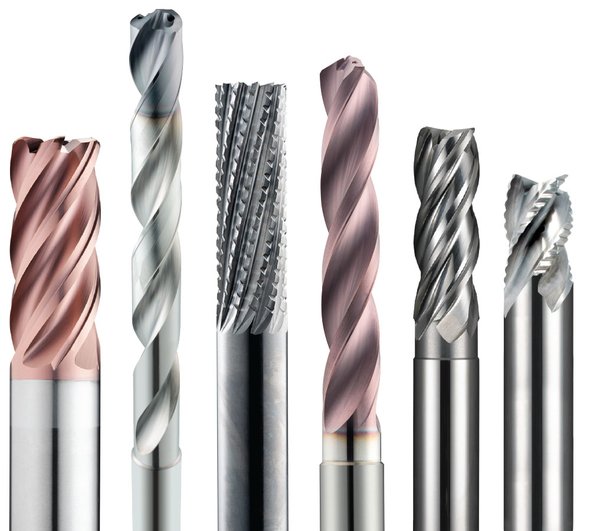ENGINEERED COATING
TECHNOLOGIES
Innovative Coating Development
Engineered tool coatings are at the core of our commitment to enhancing cutting tools. We focus on delivering superior coating solutions that elevate tool performance. With dedicated facilities in North America and Europe, our team of specialized coating scientists and advanced laboratories continually push the boundaries of technical expertise and coating techniques, driving constant innovation in the industry.
To ensure the quality and reliability of our coatings, we employ a variety of laboratory techniques for quality control, coating analysis, and development. This includes visual inspections under magnification, precise measurements of coating thickness, and thorough evaluations of coating adhesion.



A general-purpose coating with good adhesion and abrasion-resistant properties. Suitable for a wide variety of materials
Coating
Titanium Nitride (TiN)
Identifying Color
gold
Layer Structure
Multilayer
Thickness
1–5 microns
Hardness (HV)
2200
Coefficient of Friction (Fretting)
0.40–0.65
Thermal Stability
600°C / 1112°F


Excellent thermal and chemical resistance allows for dry cutting and improvements in the performance of carbide. The coating has a high hardness giving great protection against abrasive wear and erosion.
Coating
Aluminum Titanium Nitride (AlTiN)
Identifying Color
Dark Grey
Layer Structure
Nano
Structure
Thickness
1–5 microns
Hardness (HV)
3700
Coefficient of Friction (Fretting)
0.30
Thermal Stability
1100°C / 2010°F


This ceramic-based coating ensures a smooth surface and a low affinity to cold welding or edge build-up, which makes it optimal for aluminum and copper applications. It has high toughness and high hardness.
Coating
Titanium DiBoride (TiB2)
Identifying Color
Light Grey-Silver
Layer Structure
Monolayer
Thickness
1–2 microns
Hardness (HV)
4000
Coefficient of Friction (Fretting)
0.10–0.20
Thermal Stability
850°C / 1562°F


A very wear-resistant coating with high toughness and shock resistance. Good in interrupted cuts found in applications like milling.
Coating
Titanium Carbonitride (TiCN)
Identifying Color
Pink-Red
Layer Structure
Multilayer
Thickness
1–5 microns
Hardness (HV)
3000
Coefficient of Friction (Fretting)
0.30–0.45
Thermal Stability
400°C / 752°F


The structural design of Ti-Namite-X is adapted to meet a diverse range of applications; everything from high- and low-alloy steels to hardened materials (up to 65 HRC core hardness). Ti-Namite-X is suitable for operations which require high cutting speeds, high temperatures at the cutting edge, and high metal removal rates.
Coating
Proprietary (TX)
Identifying Color
Black
Layer Structure
Nano Composite
Thickness
1–5 microns
Hardness (HV)
3600
Coefficient of Friction (Fretting)
0.45
Thermal Stability
1150°C / 2100°F


This is the hardest coating available with the best abrasion resistance. It is carbon-based so it is limited in application capabilities. This coating is suitable for machining highly abrasive, non-ferrous materials such as CFRP and graphite.
Coating
Crystalline Diamond (Diamond)
Identifying Color
Black
Layer Structure
Monolayer
Thickness
6–20 microns
Hardness (HV)
>8000
Coefficient of Friction (Fretting)
0.15–0.20
Thermal Stability
800°C / 1470°F


Features include high-wear resistance, reduced friction, and excellent prevention of edge build-up. This coating provides superior material removal rates and tool life when used in high-performance operations with difficult-to-machine materials like titanium.
Coating
Proprietary (TM)
Identifying Color
Copper
Layer Structure
Nano Composite
Thickness
1–5 microns
Hardness (HV)
3600
Coefficient of Friction (Fretting)
0.45
Thermal Stability
1150°C / 2100°F


This coating demonstrates a superior combination of hardness and adhesion in hard machining of molds and dies and machining high-alloy stainless steels for high temperature applications such as turbines. The smooth surface ensures optimum surface quality and decreases the temperature in the cutting zone by reducing friction.
Coating
Proprietary (TH)
Identifying Color
Copper
Layer Structure
Nano Composite
Thickness
1–5 microns
Hardness (HV)
3800
Coefficient of Friction (Fretting)
0.30
Thermal Stability
1100°C / 2010°F


The nano-layers of this coating provide high hardness for exceptional wear resistance and high oxidation resistance that allows for operation at high temperatures. The layered structure also gives the coating the toughness required to resist chipping. MEGACOAT NANO is particularly effective in high efficiency machining applications.
Coating
Proprietary (MN)
Identifying Color
Purple Iridescent
Layer Structure
Nano Composite
Thickness
1–5 microns
Hardness (HV)
3600
Coefficient of Friction (Fretting)
0.45
Thermal Stability
1150°C / 2100°F